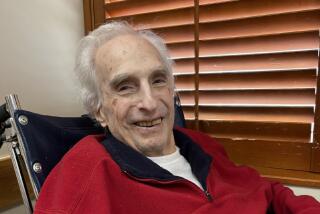Daniel Keyes, author of 1966 novel ‘Flowers for Algernon,’ dies at 86
Daniel Keyes, whose fascination with the workings of the mind drove a writing career that produced the classic 1966 novel “Flowers for Algernon,” died Sunday at his South Florida home from complications of pneumonia, his family said. He was 86.
“Flowers for Algernon,” which Keyes initially wrote as a short story, goes inside the head of Charlie Gordon, a man with an IQ of 68 who is painfully aware of his mental limits and yearns to be smart.
The novel takes the form of Charlie’s journal entries or “progris riports,” which are filled with his spelling and grammatical mistakes until he undergoes an operation that enhances his intelligence, much as it had with Algernon, the lab mouse that had the surgery first. But when Algernon regresses, Charlie realizes that the same fate awaits him.
“I was deeply moved and always in awe of the way Keyes used subtle changes in voice to illustrate the mutating nature of Charlie’s intelligence,” Steven Gould, president of the Science Fiction & Fantasy Writers of America, said this week. “Today I’m finding it incredibly poignant that Charlie’s last expressed wish in both the short story and the novel is that someone put flowers on Algernon’s grave.”
“Flowers for Algernon” brought Keyes some of the highest honors in science fiction: the Hugo Award for the 1959 short story and the Nebula Award for the novel. It also inspired numerous adaptations, including a 1980 Broadway musical and a 2000 TV movie starring Matthew Modine. The most famous adaptation, however, was the 1968 movie “Charly,” which starred Cliff Robertson in an Academy Award-winning performance.
Most of Keyes’ subsequent novels and nonfiction work delved into mental illness, including “The Minds of Billy Milligan,” a 1981 Book of the Month Club selection that was the true story of an Ohio rapist who was found not guilty by reason of insanity after a precedent-setting defense that established that he had multiple personality disorder.
“The challenge of first unearthing this story … and then telling it intelligibly was a daunting one,” Washington Post critic Joseph McLellan wrote in 1981 about the Milligan book. Keyes “has carried it off brilliantly, bringing … not only a fine clarity but a special warmth, and empathy for the victim of circumstances and mental failings that made ‘Flowers for Algernon’ one of the most memorable novels of the 1960s.”
Born in New York City on Aug. 9, 1927, Keyes grew up in a poor family during the Depression. His parents, William and Betty, had little formal education and frequently told their son they wanted him to become a doctor. After high school in Brooklyn, Keyes enrolled at New York University as a pre-med major even though he was not passionate about the subject.
When World War II began he joined the U.S. Maritime Service and was enlisted as a ship’s doctor and cook despite a lack of qualifications for either job. When a sailor became violently ill after taking a homemade hangover cure, Keyes tried to save him but was too late.
The death gave him the push he needed to abandon a medical career. “Like Somerset Maugham and Chekhov and Conan Doyle, I had been a doctor for a while and failed,” Keyes wrote in his 2000 memoir, “Algernon, Charlie, and I: A Writer’s Journey.” “Now, I would keep following in their footsteps and try to become a writer.”
After the war he worked as a pulp fiction editor, ran a photography studio and took night classes in psychology and literature at Brooklyn College, graduating in 1950. He later earned a master’s in English and taught writing at Wayne State University in Detroit and Ohio University in Athens, Ohio.
He married Aurea Vazquez, a fashion stylist and photographer, in 1952; she died last year. His survivors include two daughters, Leslie and Hillary, and a sister.
In 1953 he began teaching high school English. A remark by one of his slow-learning students helped spark the story that would become his first novel: “I want to be smart,” the student said. Those words “haunt me to this day,” Keyes wrote in his memoir.
His story about Charlie’s triumph and tragedy has never gone out of print, selling more than 5 million copies and spurring countless middle-school essays about intellect, emotion and identity. “I don’t know what’s worse,” Charlie says after the operation, “to not know what you are and be happy, or to become what you’ve always wanted to be, and feel alone.”
In 1999 Keyes read a newspaper story headlined “Scientist Creates Smarter Mouse,” about a Princeton University researcher’s manipulation of mouse genes. He was excited that science was catching up with his fiction but wary of what further progress could bring.
“I’ve learned,” he said, “that intelligence alone doesn’t mean a damn thing.”
Twitter: @ewooLATimes
More to Read
Start your day right
Sign up for Essential California for the L.A. Times biggest news, features and recommendations in your inbox six days a week.
You may occasionally receive promotional content from the Los Angeles Times.







